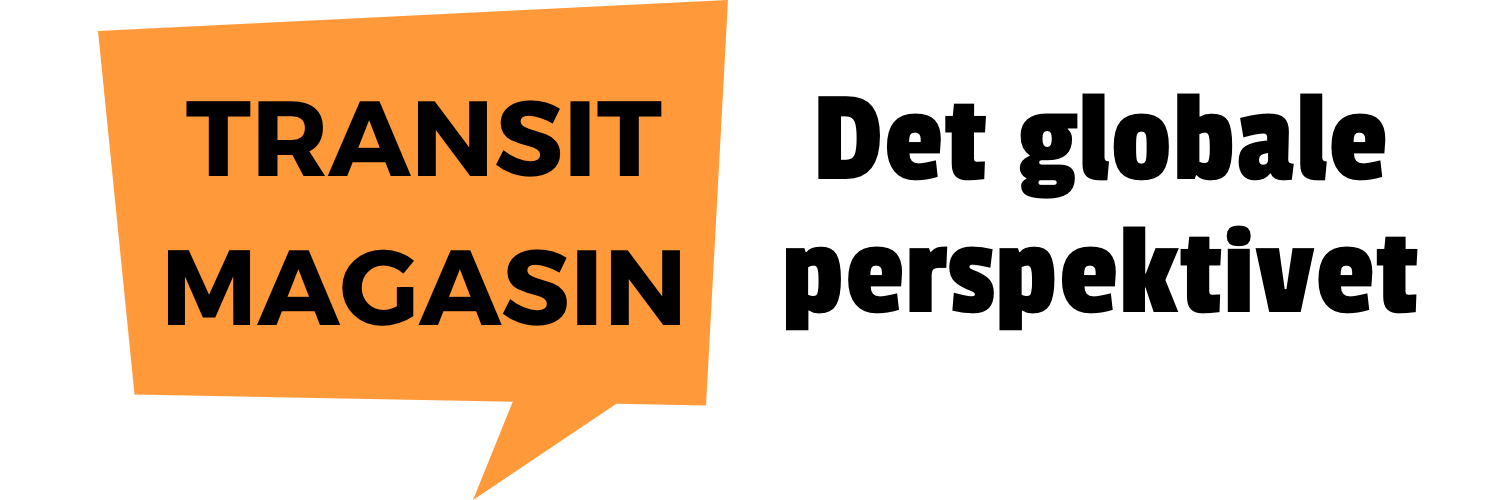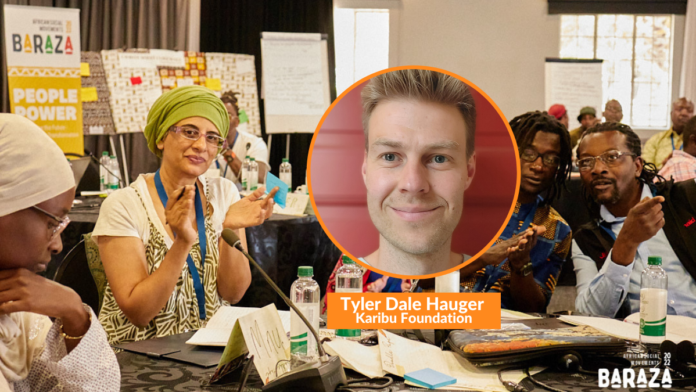By Tyler Dale Hauger, Senior Advisor at the Karibu Foundation
The world is still dealing with the aftermath (and current implications) of the pandemic, and Africa is no exception. The UN warns that the continent is facing the biggest food crisis in modern history – with a «perfect storm» of problems, including conflict, climate change, increased food prices and limited income opportunities after the pandemic, and the risk of global recession. These crises will contribute to serious long-term effects, especially for already vulnerable groups.
Social movements and activists in Africa have been sounding the alarm about these converging crises for a long time. They have emphasized that we – the global civil society – cannot wait to search for new solutions that can contribute to new paths towards a more just, free, and sustainable society.
A meeting space for social movements
It is in this context that participants from organized grassroots groups in over 30 countries in Africa gathered in South Africa in October 2022. The groups met for a joint meeting called the «African Social Movement Baraza.” The meeting was organized by Trust Africa, Center on African Philanthropy and Social Investment (CAPSI), and the Wallace Global Fund – together with several African social movements. I participated on behalf of the Karibu Foundation .
The word «baraza» means «important meeting place» or «convergence» in Swahili. The gathering held in Johannesburg was just that: a joint, multi-day meeting place for participants from, among others, the African environmental, labor, women’s, peace, farmworker, student, solidarity, and LGBT+ movements.
The aim of the gathering was to map the lessons learned from mass social movements, grassroots movements, and established organizations from the past few years. This includes lessons from the impacts of the global pandemic. The meeting equally focused on the necessity to identify a common way forward in support of sustained social change from an African civil society perspective.
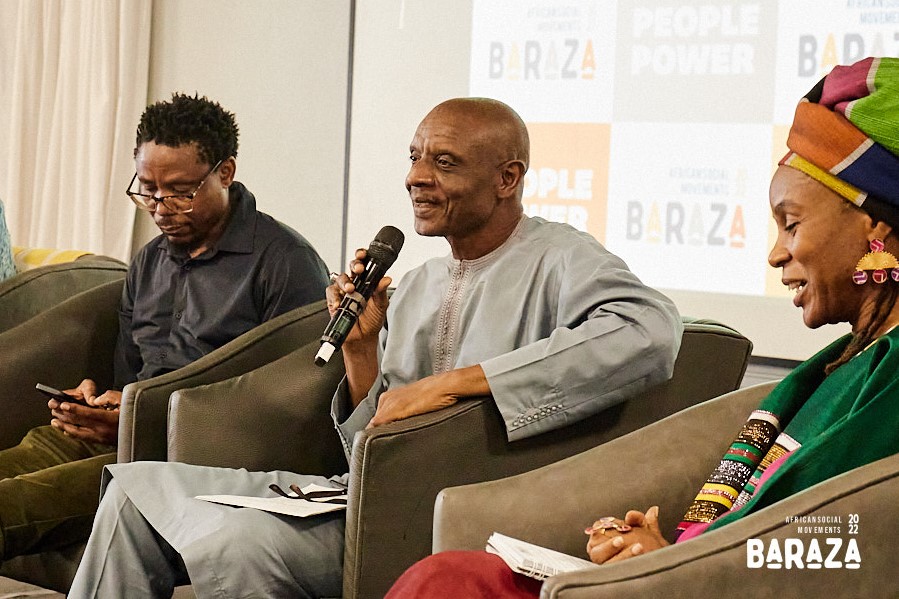
Five challenges
It is impossible to summarize the nuances and individual stories that were shared, especially knowing that social change is context-specific. I heard, however, five common challenges for social movements in Africa post-COVID-19:
1. » Shrinking Space» has made the struggle even more demanding
Social movements are experiencing that the democratic space for activists, social movements and civil society organizations is getting smaller and smaller in the face of oppressive and restrictive methods from state and non-state actors. This is often called “shrinking space” for civil society in an international context.
The freedom for civil society is being tightened, and this has only increased during the pandemic. Groups such as Amnesty International and CIVICUS have reported that civil society in Africa (and worldwide) are increasingly faced with legislation that limits their ability to organize. Legitimate social protest is often criminalized. Authorities in many countries have tightened their grip especially during the pandemic. With the introduction of various states of emergency and emergency laws, there have also come measures to censor or silence critical voices.
The impacts of this closing space have played a huge part in the possibility for social movements to act. It has influenced the way African movements can organize, the way people protest, and the kind of non-violent actions that work. It has also risked the lives and safety of activists. This has had particular relevance for movements in, among other places, Benin, Senegal, Chad, Côte d’Ivoire, Djibouti, Eswatini, Ghana, Kenya, Nigeria, Tanzania, Zimbabwe and Uganda – who saw many members of protest movements detained or killed in 2021
Social movements have identified the need for a more targeted, collective effort to protect the rights to expression, assembly, access to information, and association.
2. There is a need for movement building
The participants held a common view that social movements in Africa are generally fragmented, have been disrupted, or are perhaps lacking common goal or vision. There are some notable cases of significant transformations led by social movements on the continent in recent years (including the #FeesMustFall movement in South Africa, Balai Citoyen in Burkina Faso, and Y’en a Marre in Senegal). But COVID-19 has contributed to groups not relating to — and not communicating with — each other in the same ways they used to before the pandemic.
Many participants expressed a lack of a common «binding thread» that could bring groups together across their various struggles. There is not one issue that is rousing movements around the entire continent right now as it has done before (for example debt, medicine, or collective efforts against Apartheid). The closest binding thread can be a broad «justice agenda» (i.e. economic, gender, climate, and/or political justice), but this presents challenges related to a shared joint message or rallying point.
In that way, movement building and enabling space for agency were identified as critical measures for many movements going forward. More focus is required on connecting activists to each other as individual activists, as different institutions, and as different movements in the world.
3. It is not enough to only put a “bandage on the wound”
Given the overlapping economic, ecological, and social challenges that Africa is currently experiencing, there was a genuine consensus from the activists who gathered in Johannesburg that change must be systemic. It was not enough to only put “a bandage on the wound,” or solely mobilize vast amounts of financial resources in humanitarian aid to Africa.
The activists called for a new paradigm that prioritizes human needs, people’s interests and people’s rights over profit, greed, corruption and kleptocracy (internationally and in Africa). These solutions should emerge from the bottom-up through lived realities of those who are on the frontlines of the challenges we are facing.
As Hellen Grace Akwii-Wangusa (former African Coordinator for the UN Millennium Development Goals) said at the start of the pandemic, we are living in a rare moment to build the new. ‘As the flaws in the “old” system are being displayed openly, we are in a historic time where we can more clearly articulate the alternative world we have been trying to build for years.’
Social movements still share this sentiment: that the time is still ripe to build something systemically new.
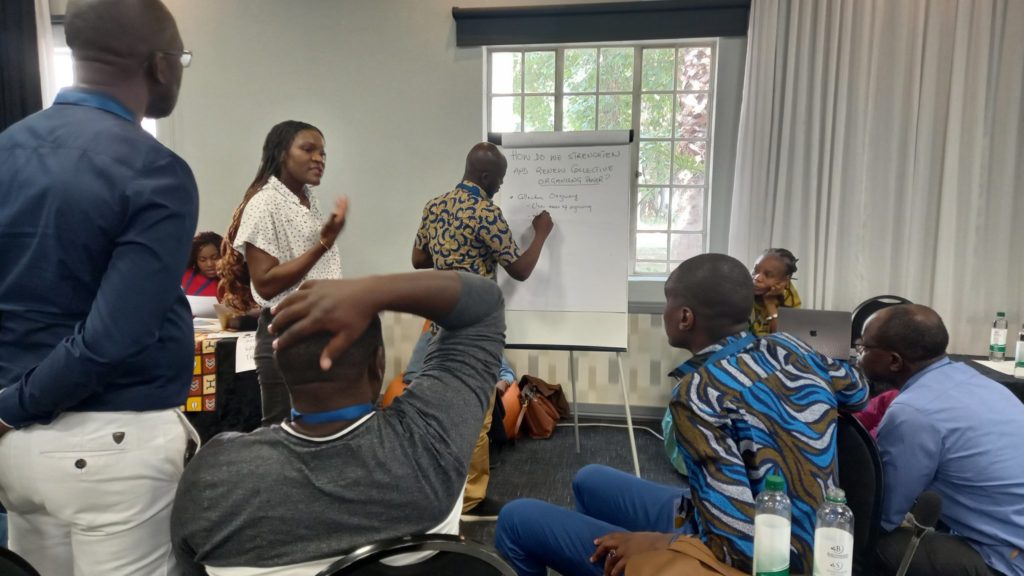
4. There is a need to ensure the mental and physical well-being of the activists
Much of the conversation in Johannesburg was focused on the activists’ own experiences of the need for protection – both mental and physical – as a result of COVID-19. The pandemic has hit Africa dramatically, and movement members have experienced that this has taken its toll on their own bodies and psyches in their work for a fairer world and a fairer Africa.
Groups have been affected differently by the pandemic and infection-reducing measures. Many lost their livelihoods due to food shortages, trade freezes and closed borders.
A lopsided distribution of vaccines on a global basis also hit Africa hard. The Norwegian Ministry of Foreign Affairs writes in October 2022 that «Access to covid-19 vaccines is still very uneven. While 75 per cent of the population in high-income countries have received their first dose of vaccine, this applies to only 24 per cent of the African population.»
The activists experienced that the pandemic has left many people still feeling scared, sad, tired and/or angry, and they spoke of a need protect the mental and physical well-being of the activists in these challenging times.
5. Donors must also be willing to rethink
Participants also spoke about how it was not enough that social movements had to think anew – their cooperation and solidarity partners must also be willing to change to meet today’s challenges. They spoke of the need for deeper, reciprocal relationships with international partners that was based on trust, openness, and a common commitment to share power in agenda-setting and decision-making.
Many activists spoke of their feeling that they are losing room for action and agency to make their own decisions (both due to «shrinking space » but also demands from the international donor community).
I heard one participant say «Don’t buy me shoes if you already know where you want me to go with them».
In this sense, the movements members articulated a need for new solutions that can contribute to more participatory and democratic practices when it comes to the distribution of money.
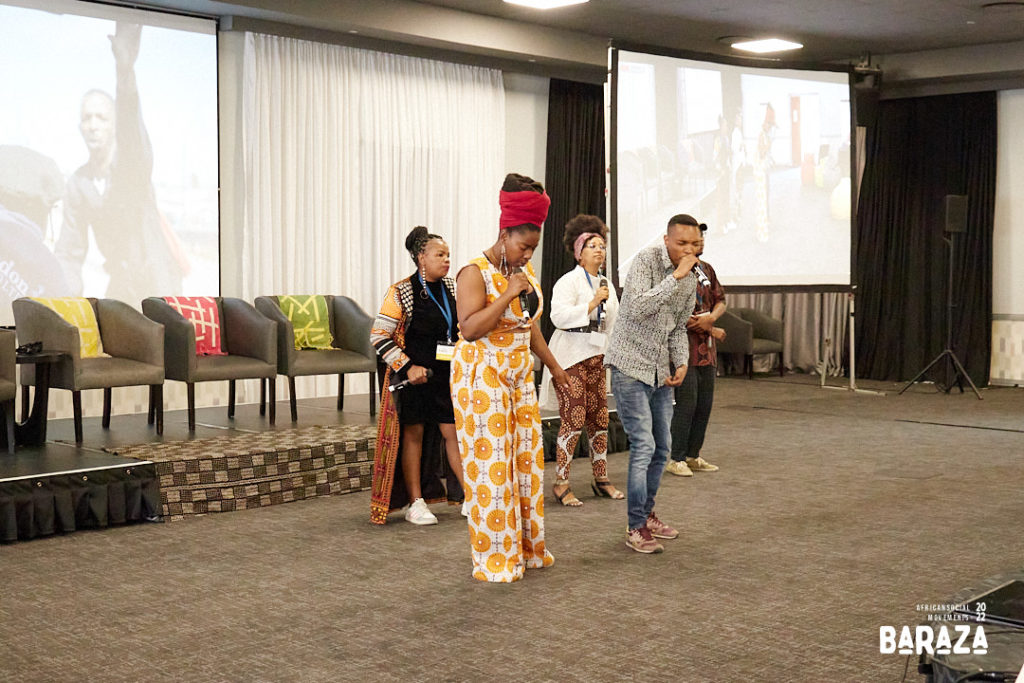
For us at the Karibu Foundation, we have initiated an innovative pilot project – «Karibu New Realities Grant» – where activists and civil society members from several countries in Africa have co-created a new grant program in the foundation. This group has developed the main elements of the grant scheme, including concrete goals and target groups, award criteria, case management processes and reporting processes. The group has also decided which African actors will receive the money within this scheme. And moving forward, there will be a particular focus on the needs of social movements.
We need to be willing to try out new models for allocating money in a way that is rooted in the experience and knowledge of groups that are directly affected.
Creating the future together
The movements that gathered in Johannesburg were clear that they were ready for new collaboration, joint campaigns, and a more clearly focused commitment to meet the most pressing tasks of the times. They were clear that creating the future together requires a joint effort.
It will be important for global civil society to stand in solidarity – and listen to their experiences and demands – at this critical moment for the future of the planet.
This text is written by Tyler Dale Hauger, Senior Advisor at the Karibu Foundation. The Karibu Foundation supports alternative voices from the Global South that provide alternatives to the dominant paradigms of power, distribution, and development.
Seniorrådgiver i Stiftelsen Karibu.


